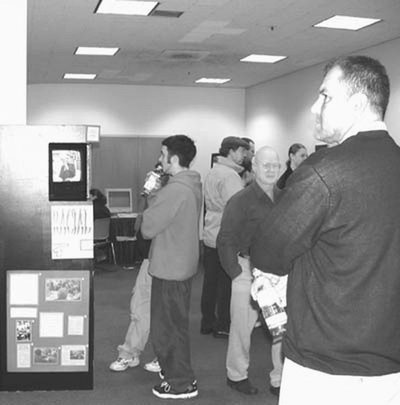February 14, 2002
Student Voices: UW-led project brings high school students face to face with public issues
Christina Roux never saw her Franklin High School economics students so engaged — designing dynamic Web sites, poring through the daily papers, throwing themselves into research projects.
What awakened her students’ interest, she says, was UW’s Seattle Student Voices project, which last fall brought mayoral debates and real-world issues to history and social studies classrooms at Franklin and 14 other local public and private high schools.
“It made us what I call a ‘now classroom,'” Roux said. “Every day, in real time, there was something new to read about and incorporate into what we were learning.”
Part of a national civic-education project, Seattle Student Voices began by getting candidates inside the high schools during the hard-fought Seattle mayoral campaign. Students researched issues ranging from traffic gridlock to teen-dance restrictions, and then got to grill the candidates about them. The teen-agers weren’t shy.
“For the students, part of it was showing that government can be accessible and politics can be fun,” said W. Lance Bennett, project director and UW professor of political science and communications. “For the teachers, it made the city their classroom — it’s just a better way to teach.”
Seattle Student Voices culminated in a UW campus Civics Fair late last month, which brought hundreds of high-school students to the HUB to show off videos, displays and other presentations on public issues to a distinguished panel of judges.
Roux’s Franklin High students took first prize with an interactive, 70-page-deep Web site (located at www.seattleschools.org/schools/franklin/FHS%20Site/transportationMATTERS/home.htm) documenting Seattle’s transportation quagmire and potential solutions.
“We learned a lot about what’s behind the congestion, like the need for alternative solutions, flex-time and alternate fuels,” said Franklin junior Carmen Wong, who did much of the design work on the prizewinning site. “Students even went out to malls and freeways and took pictures, which we posted on the site.”
Wong and her classmates voted to use their $5,000 prize money for an educational field trip to New York next year, said Roux.
With Seattle Student Voices completed, Bennett’s UW Center for Communication and Civic Engagement has launched Justice Talking, a similar project that tackles the legal system. Again, students will be immersed in real-world issues — this time Internet censorship and school vouchers — and will bring them to life through participatory events such as mock trials.
“We’re trying to cover the whole spectrum of civic life,” said Bennett, who arranged the $400,000 contract with the Annenberg Foundation and Pew Charitable Trusts.
The Center for Civic Engagement, a center in the department of communication and co-sponsored by political science, hired project manager Wendy Marker and provides teachers with curriculum materials and support, including a computer in every participating classroom (the Student Voices Web site is located at http://student-voices.org/).
Driving Student Voices and Justice Talking is growing national concern over the disengagement of young people from public life, as illustrated by the fact that less than a third of 18–20 year-olds voted in the last presidential election. Students’ knowledge of such basics as the identity of their congressman also is dropping, and even adults in their 20s and 30s pay decreasing attention to the news. Evaluation is still under way, Bennett said, to see if Seattle Student Voices measurably raised its participants’ civics knowledge and engagement.
Franklin High’s Wong doesn’t need to wait. She knows it made a difference to her and her classmates.
“It’s not like anyone is going to go out and run for mayor,” Wong said. “But it’s definitely made us a lot more interested in what’s going on.”



